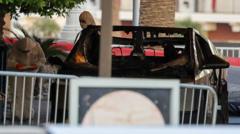The recent explosion of a Tesla Cybertruck outside of President-elect Donald Trump's Las Vegas hotel has captured national attention, revealing the identity of the driver and raising questions about the motives behind this tragic incident. The individual who rented the vehicle, Matthew Alan Livelsberger, a 37-year-old active-duty US special forces soldier from Colorado, was found deceased in the charred remains of the vehicle.
Las Vegas police confirmed the connection between Livelsberger and the wreckage, but they are still awaiting DNA confirmation, as the body was severely burned and had sustained a gunshot wound to the head, which authorities believe to be self-inflicted. The explosion, which occurred after the vehicle was filled with fuel canisters and firework mortars, injured seven bystanders, though their injuries were reported as minor.
Sheriff Kevin McMahill spoke about the nature of the event during a press conference, stating, “I’m comfortable calling it a suicide with a bombing that occurred immediately after.” Livelsberger rented the Cybertruck on December 28 in Denver, Colorado, before driving it to Las Vegas. With years of military service under his belt, he had transitioned to active duty in December 2012 and was currently on approved leave during the time of his death.
Livelsberger's father shared insights about his son, revealing that he had been serving in Germany and returned home to visit Colorado, where his wife and eight-month-old daughter reside. The father reported that their last conversation at Christmas seemed unremarkable, offering no signs of distress.
The investigation continues as authorities work to uncover what led to this devastating event. As details emerge, this situation poses serious questions about mental health, military support, and the need for vigilance in addressing concerns in our armed forces.

















